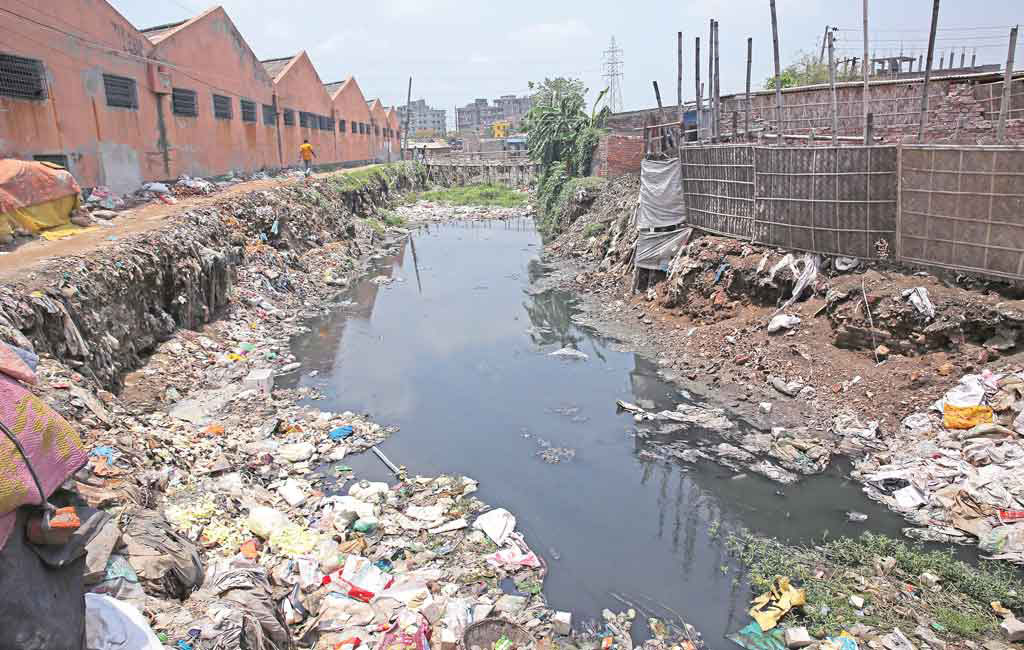Before our rivers run dry

Dhaka, April 22, 2020: Bangladesh is a riverine country, and rivers are the lifeline of our economy and environment. They are crucial for the very existence of Bangladesh as a delta country. Unfortunately, many of the rivers in Bangladesh are in critical condition.
Around 450 rivers in the country face serious threats mainly due to rampant grabbing and indiscriminate polluting by the industries through toxic waste-dumping.
Recently, the government has taken certain initiatives to free rivers from encroachers.
Bangladesh has always been rich in sources of water. The total amount of wetland is 11% to that of the total volume of the country. Rivers are being polluted every day and the rivers in Dhaka are a great example.
Due to major industrialization in the last few decades, Dhaka has become filled with factories and workshops. According to estimation, there are over 7,000 industries in the Hazaribagh, Tejgaon, and Dhaka-Narayanganj-Demra dam areas alone. The waste produced by these industries is connected to the sewerage systems which end up in the rivers. In the Karnaphuli, almost 5,000 tons of waste is thrown out every day.
Prime Minister Sheikh Hasina has called for a proper river management system, as the present government is seriously concerned about the protection and conservation of the rivers. Our legal status to protect rivers is a little bit better than other countries of the globe. We have a constitutional mandate to protect nature, rivers, wetlands, and natural resources.
Bangladesh is also a member, in a primarily active state, of incorporating the UN International Watercourses Convention of 1997.
In our constitution, Article 18A clearly states that: “The state shall endeavour to protect and improve the environment and to preserve and safeguard the natural resources, bio-diversity, wetlands, forests, and wild life for the present and future citizens.”
Our country has enacted a number of laws including the Bangladesh Water Act 2013, the Water Resource Plan Act 1992, the National Water Policy 1997, the National River Conservation Commission Act 2013, and a few others. The High Court Division (HCD), in its landmark judgment on river protection, declared that keeping rivers from pollution and encroachment is a fundamental right.
Bangladesh is among the few countries that have a separate court on environment.
From 2000, after the enactment of the Environment Court Act, a specialized environmental court system has been introduced into the legal system of Bangladesh. In 2010, a new Environment Court Act, namely the Bangladesh Environment Court Act, was passed. The present act is aimed to establish one or more environment court(s) in each district with a joint district judge.
In this act, it provides mobile courts and regular courts’ jurisdiction by special magistrates who will be deputed from the judiciary for taking stringent action to protect the environment, rivers, and other natural resources. There are only three environment courts across the country with a few cases, due to some legal barriers.
On April 23, 2018 the National River Conservation Commission (NRCC) held a meeting and took the decision to revisit existing laws related to rivers, and agreed to take steps to set up eight special courts for the disposal of the cases on rivers. The commission has published a list of 49,162 criminal river grabbers across the country in 2019.
Our higher judiciary always keeps an active role to protect environment, rivers, and natural resources. The HCD clearly declared pollution and river-grabbing as criminal offenses and directed the government to set up separate courts or tribunals for the trial of offenses related to rivers. It also mandates that the precautionary principle and polluter’s pay principle are part of the law of the country.
The HCD also announced that river encroachers cannot run in any elections or get bank loans. In many cases and writ petitions, our apex court contributed a leading role to maintain the rivers and natural resources in recent years.
The NRCC was formed without giving it any authority to implement major decisions. However, the commission has already taken some good decisions, but those have not been implemented yet. The NRCC needs to be made stronger in its jurisdiction. The existing legal periphery is very challenging when it comes to maintaining strong action and ensuring severe punishment against perpetrators — the present law does not permit exemplary punishment and a huge fine for the offense of polluting the rivers.
There is no regular court to file cases and complaints against polluters and grabbers. It is only now that certain mobile courts, led by the executive magistrates who don’t have sufficient power to impose severe action and punishment, are trying to take action against serious offenses related to rivers.
To ensure justice and severe punishment against river pollution and illegal possession, setting up a river court or tribunal is a need of the hour to protect and conserve the lifeline of the country.
Read More
,

